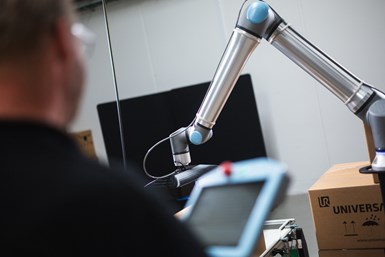Compact Industrial Cobot Features Enhanced Motion Control
IMTS22: Universal Robots’ new UR20 cobot is a completely re-engineered cobot that can handle faster cylce times and heavier loads.
Share



.png;maxWidth=45)
DMG MORI - Cincinnati
Featured Content
View More


Hwacheon Machinery America, Inc.
Featured Content
View More
Autodesk, Inc.
Featured Content
View More

ECi Software Solutions, Inc.
Featured Content
View MoreUniversal Robots, a Danish manufacturer of collaborative robots (cobots), showcases the new 20 kg UR20 cobot, which boasts an all-new design based on Universal Robots’ experience in highly refined engineering.
The UR20 features an entirely new joint design that will reportedly enable for even faster cycle times, as well as the ability to handle heavier loads. Its 1750 mm reach has been designed to work to the full height of the standard Euro-pallet, which the company says will transform the way businesses package and palletize. Its small footprint will enable companies to achieve more within their existing production space. The cobot is said to boast a 44-lb. payload and 69" reach.
In addition to palletizing, Universal Robots expects the UR20 to be used for welding, material handling, machine loading and machine tending, as well as for innovative solutions created by its extensive partner ecosystem.
Universal Robots’ engineers have completely re-engineered the arm while retaining the same user interface as previous models. According to the company, the benefits of the UR20 include significant advances in cycle times and the ability to handle heavier loads. The cobot also features advanced software enhancements, which is said to give users unprecedented motion control capabilities.
Universal Robots says it launched the world’s first commercially viable cobot in 2008 and has since built an ecosystem of more than 1,100 integrators, distributors and independent partners creating components, kits and applications for its cobots. The company says it has drawn on the knowledge gained through its established customer base in the design of this latest product.
Related Content
-
Which Approach to Automation Fits Your CNC Machine Tool?
Choosing the right automation to pair with a CNC machine tool cell means weighing various factors, as this fabrication business has learned well.
-
Four-Axis Horizontal Machining Doubles Shop’s Productivity
Horizontal four-axis machining enabled McKenzie CNC to cut operations and cycle times for its high-mix, high-repeat work — more than doubling its throughput.
-
Translating a Prototyping Mindset to Production
The experimental mindset that benefited BDE Manufacturing Technologies as a prototype job shop has given it an adaptable edge as a production facility.

































.jpg;maxWidth=300;quality=90)




